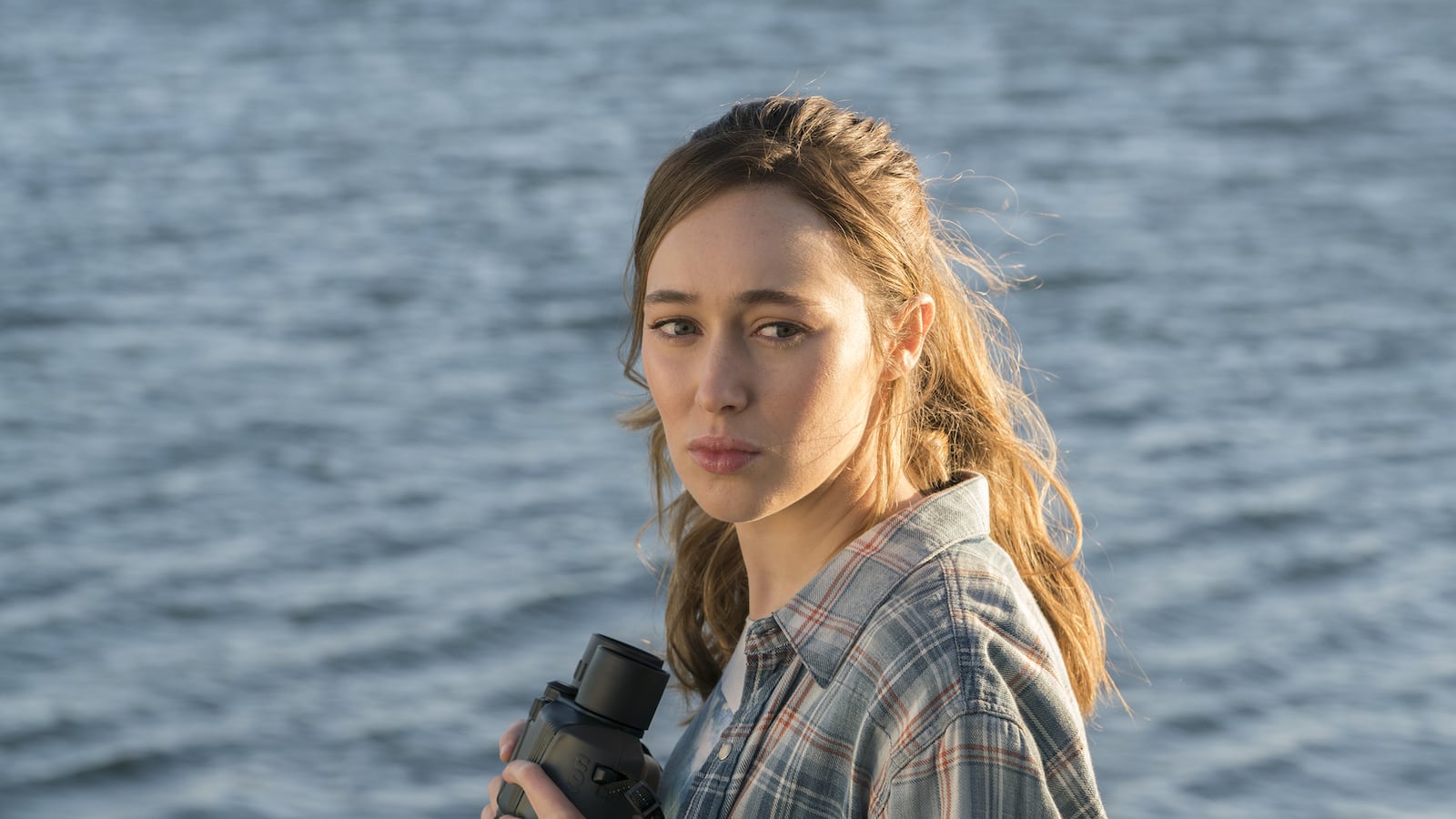Fear the Walking Dead’s second season debut comes at a time when AMC’s hardcore zombie fans are largely pissed off. Half a season of build-up for the ultimate Big Bad on Fear’s sister show, The Walking Dead, fizzled out in yet another exasperating cliffhanger—the third such bait-and-switch in recent memory, and what some see as a sign of the show’s increasingly stale and repetitive storytelling.
But as that show lumbers on toward its creative demise, one wonders what Fear, which takes place in the same world as TWD but on an earlier timeline, might offer to reinvigorate TV’s most-watched zombie apocalypse. Judging by the first two episodes of Season 2, unfortunately, it’s only flashes of originality, drowned out by more of the same.
Much of the tension in Fear’s first season came from watching ordinary people deal with the collapse of their first-world society. Those of us watching know how the whole thing turns out—with women samurai and cowboy cops ruling the world—but Madison Clark (Kim Dickens), Travis Manawa (Cliff Curtis), and their brood of angsty kids became new, inexperienced avatars through which to imagine ourselves dealing with the crises of the apocalypse: the military’s abandonment, the kill-or-be-killed mentality of mob rule, and the undead—the stuff of most city-dwellers’ nightmares.
Watching Madison discover the “aim for the head” rule of zombie-killing, for example, was a thrill long past TWD’s reach, since in its world, the apocalypse has dragged on for years and any survivors know the rules by heart. Setting sail for San Diego aboard a yacht, as Fear’s characters did at the end of last season, would seemingly provide another set of uncharted terrors to explore, in a part of the world to which TWD has never ventured.
Combine that with Madison and Travis’s complicated family dynamics, a mysterious yet intriguing stranger named Strand (Colman Domingo), and Ruben Blades’s ex-killer Daniel Salazar and his daughter Ofelia (Mercedes Mason), and Fear had the makings of a second season grounded in relatable characters yet buoyed by new seafaring horrors.
Instead, Fear’s second season flattens its characters, stifling much of what made them interesting in the first go-round. Strand, whose archness and decisiveness made him so magnetic last season, is mostly relegated here to barging into rooms and shouting, “This is my boat!” Salazar, whose experience in the Salvadoran junta during the country’s civil war lent him a pain and depth unlike anyone else, spends his screen time puttering about, pestering Strand with sneaky questions and rummaging through his things when no one’s looking.
The fascinating intergenerational differences between Salazar and his U.S.-raised daughter Ofelia fall by the wayside. So does his grief over his recently perished wife, Griselda. (Not a word is spared for poor Griselda in at least the first 90 minutes of this season.)
Alicia, who showed sparks of heroism last season in her efforts to save her junkie brother and beloved next-door neighbor, spends the entire season premiere talking into a radio, in a plot thread that never leads anywhere. Nick, all unpredictable, manic energy last season, is now mellowed and mature. And Chris, Travis’s son, is still as one-note as ever: all sour, brooding resentment.
Apart from the introduction of sea zombies (fun fact: they float), little else about Fear’s fixations here distinguish it from its sister show. The same beaten-to-death, post-apocalyptic moral quandaries—is there room for kindness and generosity in a world ruled by fear? Is it possible to survive without killing fellow human beings?—begin to consume the characters of Fear, the way they’ve obsessed Rick and Co. for six increasingly tedious seasons. The same overbearing nihilism also seems well on its way to infecting Fear, as it dwells on one tragedy, then the next, relying on gore in the absence of story-built tension.
That’s not to say there’s nothing worthwhile about Fear’s first two episodes, or its genetic similarities to TWD. Like the latter, Fear has a knack for crafting gruesome, enduring images: children playing on land as zombies slowly rise out of the sea; a little girl dying, then reanimating in her mother’s arms; a zombie’s face torn to shreds by a boat propeller.

The rare glimpses in Fear at how the rest of the country is coping with impending doom also still feel novel, if increasingly faraway as our heroes become ever more isolated. We learn that the entire Californian coast is overrun and being blanketed in napalm by our hapless government—a grim detail that widens the show’s scope and comes tantalizingly close to actually saying something about modern-day authorities and the ways they respond to crises.
But before it gets too political, the show always reels itself back, careful not to ruffle any feathers. Political commentary in a work of zombie fiction? Who ever heard of such a thing?
Instead, Fear turns back to yacht shenanigans and splashing zombies, content to set its characters on the same circular path now well-worn on its sister show: hope, travel, death, disappointment—rinse, wash, repeat.
And it’s a shame. With TV’s current overabundance of stellar genre offerings (including zombie-centric ones like the CW’s delightful iZombie), squandering Fear’s potential for originality feels almost cynical. Sure, the name brand all but guarantees advertiser-friendly ratings—but why bother if all we’re getting is a soggier version of The Walking Dead?
Still, the show’s all-star cast—veteran actors like Kim Dickens, Cliff Curtis, and Ruben Blades are always worth watching, even when they’re underutilized—and scattered moments of insight and inventiveness keep me rooting on its behalf. And with a full, 15-episode season ahead, there’s still plenty of time to turn this ship around. (Sorry.) But it had better hurry. Viewers aren’t nearly as patient as the walking dead.






